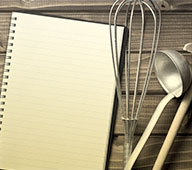Country Kitchen – September Neighbors

September is National Honey Month, and Elizabeth Whitaker of Coffee County has spent nearly 10 years maintaining hives and harvesting nature’s sweetener.
“I don’t just harvest the honey though. I make candles, lotions, lip balm, soaps and other cosmetics and bath products. I also gather the excess pollen from the hives,” Whitaker says.
Elizabeth first became interested in honeybees during her daughters’ 4-H meeting.
“My daughters were home schooled, and we hosted a 4-H club for home-schooled students. I was amazed by a guest speaker who was a beekeeper,” she says.
Later a friend passed along to Whitaker a copy of Neighbors magazine featuring Bill Mullins’ candle-making business in Madison County.
“I chaperoned a 4-H trip to Huntsville, and I called Bill to see if I could visit his operation. That experience brought me to the Alabama Farmers Federation, and Bill has been a great mentor and beekeeping friend ever since,” says Whitaker.
Originally from Illinois, Elizabeth and husband Gerald both came to Fort Rucker when they were serving in the military. Both are currently employed as civilian contractors for the military, and Elizabeth says she is a hobbyist beekeeper with 40 to 45 colonies of bees. She also currently serves on the Farmers Federation’s State Bee and Honey Committee.
Elizabeth and Gerald own Chrischelle Farms (named for their daughters Christine and Michelle) near New Brockton where, in addition to the three bee yards on their property, they loan out bees as pollinators to other area farmers. Elizabeth says honeybee operations are the kind of farming endeavor anyone can undertake.
“People have honey bees on the tops of New York City apartment buildings. Even someone in town could have a hive or two to improve their garden if city ordinances permit. It doesn’t require a lot of land, and with only a couple of hives, a beekeeper might average only a couple of hours a week working with them. We’ve helped people as young as 10 start hives with adult supervision and assistance with the heavy lifting,” she says.
Elizabeth also says beekeeping doesn’t entail much up-front cost.
“Several counties have local beekeeper clubs, and that’s really the ideal place for someone to start. Of course, there’s information available on the internet, and beekeeping starter kits available. Someone could read up during the winter, and with a few hundred dollars, be ready to start a hive in the spring,” says Whitaker.
Elizabeth says honey is the primary sweetener in her family’s diet.
“I’m not even sure where my sugar bowl is right now,” she jokes.
Elizabeth says honey should not be fed to infants less than one year of age, and recommends storing honey at room temperature away from direct sunlight.
“Refrigeration accelerates crystallization in honey, but placing the container in a bath of warm water will reverse the crystallization. Never scorch, boil or microwave honey,” advises Elizabeth.
“Reduce the amount of liquid in the recipe by 1/4 cup for each cup of honey used. Add 1/2 teaspoon of baking soda for each cup of honey used. Reduce the oven temperature by 25 degrees to prevent over-browning,” she suggests.
“People who use honey to bake bread love the results, and it’s excellent for sweetening coffee and tea,” she says.
